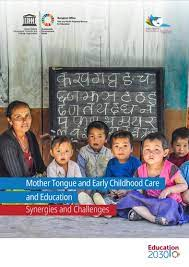A mother tongue, also known as a native language or first language, is the language that a person learns from birth or infancy within their family or community environment. It is called a mother tongue because it is typically taught by the mother or primary caregivers within the family setting. The term “mother tongue” (although a bit old-fashioned) emphasizes the intimate connection between a person’s language and their familial and cultural background. It represents the language that is passed down from generation to generation within a particular community or cultural group, shaping the individual’s identity, communication skills, and cultural heritage.
When does a language die? According to UNESCO, it is estimated that more than 40% of the approximately 7,000 languages spoken worldwide are endangered or at risk of extinction if no efforts are made to preserve and revitalise them. This means that over 2,800 languages are in danger of disappearing. Languages that have either no native speakers left or are on the verge of extinction, with very few speakers remaining are called dead or dying languages.
Why are languages dying?
The United Nations suggests that several factors influence the status and retention of a language within a community like:
• Poverty: In economically disadvantaged areas, access to education and resources may be limited, leading to lower levels of literacy and language proficiency. As a result speakers of minority or indigenous languages in impoverished regions may face challenges in preserving and transmitting their languages to future generations. Economic disparities can also contribute to language shift, as speakers may prioritise leaming the dominant language of the majority population in order to access opportunities for education, employment, and social mobility.
• Migration: When individuals or groups migrate to new countries or regions, they often encounter linguistic diversity and may need to leam the language(s) of the host society in order to communicate and integrate effectively. This can lead to language shift, particularly among second or thing-generation immigrants who may prioritise the majority language(s) for social, economic, and educational reasons.
• Complexity of language syntax the syntactic complexity of a language can influence its status and retention within a community. In communities facing socio-economic challenges or undergoing rapid socio-cultural changes, languages with difficult syntax may be perceived as barriers to communication, education, and social mobility. As a result, speakers may gradually shift towards simpler or more widely spoken languages that offer greater accessibility and utility in everyday interactions.
A mother tongue is crucial for a child’s all-round development
• Cognitive development: Research suggests that children who are proficient in their mother tongue tend to develop stronger cognitive skills, including problem-solving, critical thinking, and memory retention. This foundation in their first language provides a scaffold for learning additional languages and academic subjects.
• Emotional connection: The mother tongue is closely linked to a child’s sense of identity, culture, and belonging. It forms the basis of communication within the family unit, fostering emotional connections and a sense of security when children are able to express themselves fluently in their mother tongue, they feel validated and understood which contributes to their overall well-being. Moreover, this connection to their cultural heritage instills a sense of pride and appreciation for diversity, fostering cultural continuity and resilience.
• Academic success: Research suggests that kids who receive education in their first language often perform better in school, as they are able to grasp complex concepts more easily and engage more actively in learning activities. Additionally, a strong foundation in the mother tongue provides a smoother transition to learning additional languages.
How Do We Save Our Mother Tongues
To safeguard our mother tongues, it is imperative that we take proactive measures. Parents can play a crucial role by introducing their children to rhymes and stories from their native languages. Teachers should advocate for linguistically appropriate curricula, particularly by prioritizing early education in mother languages. In 1999, countries globally adopted a resolution promoting multilingual education, yet the implementation often falls short. While schools mandate learning three languages, the focus on regional languages is often minimal. Shockingly, 40% of people worldwide lack access to education in their native language, leading to marginalized communities avoiding schools altogether. To address this, we must raise awareness and strive for more inclusive educational policies that honors and preserve our rich linguistic heritage.
Picture Credit : Google

Leave a Reply